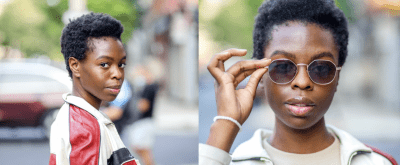“Getting Worse/Better”: Talking to Samantha Irby about her New Book, We Are Never Meeting in Real Life
A couple of years ago, as a graduate assistant at the University of California, Riverside, I assigned Samantha Irby’s “My Mother, My Daughter” as a mid-quarter palette cleanser to classrooms full of brown and black students who had been inundated with the words of old straight white men. Irby calls herself a “regular person”: she worked the same day job at an animal hospital for fourteen years until she landed a much-deserved book deal following the popularity of her blog, Bitches Gotta Eat. This May, the self-proclaimed “mama charmer” is following her first collection of essays, Meaty, with We Are Never Meeting in Real Life. A TV show based on her life is also in the works with Abbi Jacobson of Broad City. True to her title, I didn’t get an invite up to Michigan to interview Irby IRL, but I did upgrade from Facebook groupie to telephone gal pal.
In a lot of your essays, you speak to the dilemma of people’s expectations of you based on what they’ve read on your blog. What do you feel like has been your most awkward encounter?
I ran into this woman once in the grocery store… and she just started talking to me about Crohn’s and shitting. You know I’m open with that, but I had a really embarrassing shopping cart. It was a bunch of single person meals, but also two kinds of ice cream. I was a little bit worried if she would be judging that, but also mostly worried about [the ice cream] melting. How awkward it would be for me to extract myself from this conversation? Or, once it came to a natural end, should I go and get different ice cream because I’ve talked to this person for so long? That’s the kind of shit that makes my anxiety just shoot through the roof. I was just trying to have this be a quick dip into the store and now I’m talking to this woman who is very nice and I appreciate the $11 she spent on my book BUT I already spent four real minutes in the ice cream aisle and I don’t want to do that again. Because I’m a narcissist I assume that everyone is counting the minutes that I’m debating ice cream choices… Also, I feel safe talking about my bowels on the internet but that’s not like public grocery talk. I was just like, “Girl my email is on my blog, could you just message me about your gastrointestinal journey?”
You and Roxane Gay get mistaken for each other quite a bit—despite not looking alike at all—could you imagine a stranger walking up to her in the grocery store and striking up a convo about their digestion issues?
Yes, I can! I did this reading in Chicago right, and my name was on the poster and the whole thing and some girl was like, “Hi, are you Roxane Gay? I really love your work.” And I was like, “NOPE. I am not.” She then said, “Are you sure?” C’mon, man, if you keep talking to me for two minutes you’re going to figure out I don’t sound like a college professor because I don’t know anything at all, so let’s spare us this awkward interaction. Just take my word that I am not her. I feel like the whole show she just kept [thinking I was Roxane Gay]. Finally, I get on stage and they say my name. She was sitting right in the front, so maybe it crystallized at that point.
Since the release of your first book, you’ve leveled up your writer’s circle. What’s it like being friends with writers you admire?
My blog made its way around before I did. I would internet-meet people and they’d be like, “I’ve read your stuff,” and I’d be like, “LOL–Where?!” That’s the magic of the internet: people who are cool posting things and other people seeing that. So, I can’t take any real credit for jumping on people’s Facebook and being like, “Hey! We’re friends now!” I met Roxane in 2011 or 2012. Someone suggested I submit a piece to The Rumpus and they connected me with Roxane. She was editing for The Rumpus at the time. I wrote that essay about my mom and she edited it and published it and I was like, “Well okay, we’re going to be friends now. Whether you like it or not, you are forever burdened with being my friend and twin.”
What were some of the differences between writing your first book and this one?
With my first book I didn’t have an editor. It was [with a] super small indie press. We just kind of threw it together and put it out. So, I had never been through the copyediting part before. I never got to see [my copy editor’s] face, but I heard she was young. She was definitely college-educated, probably white, so there were a couple of things… I didn’t really understand I had a say in the edits. At one point I was just responding to the stuff in the margins like, “Do we have to spell this out for the people that won’t get it?” I called this dude I used to date a “So Anxious”- era Genuine. She was like, “What?” And I was like “It’s okay to Google who Genuine is if you don’t know. Some people won’t have to Google that and this is for them.”
Can you talk a little bit about the show you have in the works?
We don’t see a lot of black people doing regular shit on TV. As far as I know–I could be wrong–but there’s no show based around [inflammatory bowel disease]. I really want to write a show about depressed black girls and black girls who shit all of time and black girls having friendships.
In “Yo, I Need a Job,” you write about about how it’s okay to have a regular job you go to every day that isn’t a passion or a career, just a steady paycheck. What’s it like to quit the job you worked for 14 years and focus on your writing full-time?
I am not comfortable with it yet. I feel like, “Should I go get a cashier job or something? A volunteer thing that I do every day?” It just feels weird to get up and be like, “Oh, just use your brain for your job!”
Sometimes when you get really real about black women and depression in your new book, you zoom out and let the reader know it’s difficult for you to write about these things like in “Happy Birthday” and “A Total Attack of the Heart.”
I do occasionally insert a disclaimer where I’m like, “Listen, this is hard, but I want to share it with you because I feel like somebody needs to hear this Word. But back off me if you’re going to ask me a question about it when you run into me at the bagel shop.”
I started [“A Total Attack of the Heart”] on my blog and part of it was reprinted on Elle.com. For like two weeks after that piece ran, some white dude that I finally figured out how to block kept tweeting me to say that it was racist to write about black girls being depressed as if white people aren’t also depressed. That is madness. Everyone talks about everything that white people do all the time. We need a piece like this because we don’t talk about it.
One major theme in the book is how you have worked to shed this expectation placed on women being likable.
I’m learning not to care and not to be nice just for the sake of trying to win the approval of someone who doesn’t care anyways. I’ve got to focus my energy on the people worth being nice to. There are just some people who are going to eat your breakfast and be jerks to you no matter what you do, so fuck it man. I don’t feel like anything that has ever happened [to me], at least professionally, has been because I’m a nice person I have good examples in my friends and people I admire online who just aren’t. You should appreciate what I’ve done because it’s of good quality, not because you think I’m a sweetheart.
My group of real friends and internet friends now is full of women who know what they’re doing and what they want. I have a hard time with the word deserve, but I’ll use it now. They know what they deserve and what they’re worth and that has rubbed off on me. A combination of age and not seeing how it helps anyone to mask who I really am–who benefits from that? No one really. I’m getting better. Who knows [with the] next book? I could just be balls to the wall. I’m growing, I’m changing, I’m getting worse-slash-better.
You might also like 



















